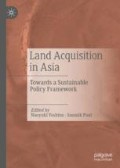Abstract
There has been a dearth of studies on the factors that incentivize people to move, willingly, much less on those who were already forced to move. Learning from the forced displacement experiences of those in the vicinity of the Falta Special Economic Zone (FSEZ) in West Bengal, India, this study identifies factors that contribute to the willingness to (re-)move. This study uses data generated from a unique household survey administered around the FSEZ region, where people who were already forced to move and those who were not were consulted on their willingness to relocate. We find support for residential land transfer to be stronger among those with property rights, but stronger social capital and current wealth dampen it. Overall, the propensity to move and expectations for compensation are lower for those with prior displacement experiences.
Access this chapter
Tax calculation will be finalised at checkout
Purchases are for personal use only
Notes
- 1.
Due to the populist revolt, as discussed in the introduction, the act has now been replaced with a more populist act (the differences between the colonial era-act and its 2013 successor are compared in the sub-section ‘Compensation in Reality’.
- 2.
These were indicated to us by participants of focus group discussions and local Panchayat officials.
- 3.
Given that the Government of India enacted a new act that governs land acquisition (and also addresses resettlement), our findings are more reflective and should be contextualized within the framework of the Land Acquisition Act 1894. A comparison of the new land bill and the Land Acquisition Act 1894 demonstrates that while those affected by the setup of FSEZs received provisions not availed in the Land Acquisition Act of 1894, they were however disadvantaged in comparison to provisions made in the recent 2013 act. Despite criticisms of increasing bureaucratic red tape in the acquisition of land by the private sector, the new act extends provisions that safeguard the interests of land owners and those dependent on that land, especially via requiring overwhelming consent among those potentially affected.
- 4.
In most instances of state-led evictions, property titles are a pre-requisite for compensation (see Shalti Research Group 2008).
References
Aggarwal, A. (2012). Social and economic impact of SEZs in India. New Delhi: OUP Catalogue, Oxford University Press.
Bardhan, P. (2011, April). Land acquisition: Currently a major stumbling block for development policy. Development Outreach. World Bank.
Bennett, O., & McDowell, C. (2012). Displaced: The human cost of development and resettlement. New York: Palgrave Macmillan.
Cernea, M. M. (1988). Involuntary resettlement in development projects: Policy guidelines in World Bank-financed projects. World Bank Technical Paper No. 80. Washington, DC: World Bank.
Garikapati, S. (2005). Consulting the development-displaced regarding their resettlement: Is there a way? Journal of Refugee Studies, 18(3), 340–361.
Gasper, D. (2015). The ethics of economic development and human displacement. In G. F. DeMartino & D. N. McCloskey (Eds.), The Oxford handbook of professional economic ethics. Oxford: Oxford University Press.
Ghatak, M., Mitra, S., Mookherjee, D., & Nath, A. (2013). Land acquisition and compensation in Singur: What really happened? Economic and Political Weekly, 48(21), 32–44.
Ghatak, M., & Mookherjee, D. (2011). Land acquisition for industrialization and compensation of displaced farmers. Working Paper No. 2011, 35. World Institute for Development Economics Research.
Ghatak, M., & Mookherjee, D. (2014). Land acquisition for industrialization and compensation of displaced farmers. Journal of Development Economics, 110, 303–312.
International Labour Organization (ILO). (2012). Trade unions and special economic zones in India. Geneva: International Labour Office.
Lam, C., Paul, S., & Sarma, V. (2016). Reversal of fortune? The long-term effect of conservation-led displacement in Nepal. Oxford Development Studies, 44(4), 401–419.
Levien, M. (2011). Special economic zones and accumulation dispossession in India. Journal of Agrarian Change, 11(4), 454–483.
Paul, S., & Sarma V. (2013). The livelihood effects of industrialization on displaced households: Evidence from Falta Special Economic Zone, West Bengal. ZEW Discussion Paper No. 13-083, Centre for European Economic Research.
Sarkar, A. (2007). Development and displacement: Land acquisition in West Bengal. Economic and Political Weekly, 42(16), 1435–11442.
Searle, R. (2010). Making space for capital: The production of global landscapes in contemporary India. Unpublished dissertation, University of Pennsylvania.
Shah, A. (2013). Mainstreaming or marginalisation?: Evidence from special economic zones in Gujarat. Economic and Political Weekly, 48(41), 55–61.
Shalti Research Group. (2008). SEZ in West Bengal: Growth trajectory impact. Kolkata, India: Shalti Samiti.
Suchitra, S. (2007). SEZs: Economic or exploitation zones?. InfoChange News & Features. Retrieved October 17, 2015, from http://infochangeindia.org/agenda/cost-of-liberalisation/sezs-economic-or-exploitation-zones.html
World Bank. (2007). India: Land policies for growth and poverty reduction. New Delhi: Oxford University Press.
Author information
Authors and Affiliations
Corresponding author
Editor information
Editors and Affiliations
Rights and permissions
Copyright information
© 2019 The Author(s)
About this chapter
Cite this chapter
Paul, S., Sarma, V. (2019). Attitudes Towards Forced Displacement in West Bengal, India: To Move (Again) or Not?. In: Yoshino, N., Paul, S. (eds) Land Acquisition in Asia. Palgrave Macmillan, Singapore. https://doi.org/10.1007/978-981-13-6455-6_8
Download citation
DOI: https://doi.org/10.1007/978-981-13-6455-6_8
Published:
Publisher Name: Palgrave Macmillan, Singapore
Print ISBN: 978-981-13-6454-9
Online ISBN: 978-981-13-6455-6
eBook Packages: Economics and FinanceEconomics and Finance (R0)

